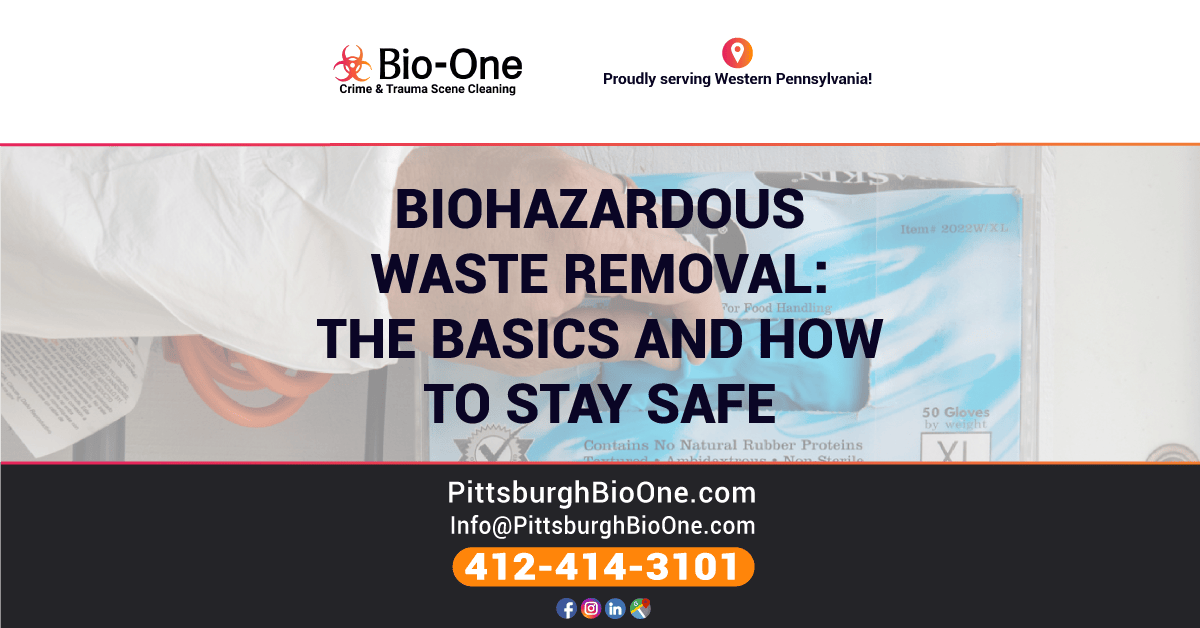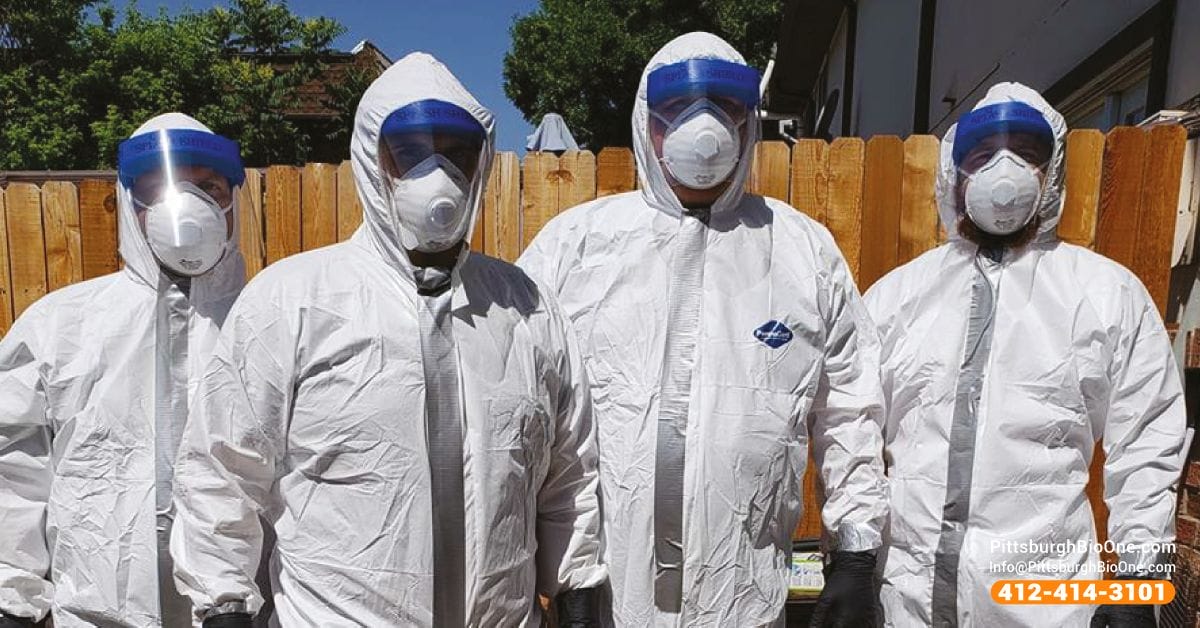
It is important to remember that biohazards can present a serious health risk. Always take precautions when conducting a biohazardous waste removal procedure, and don't take any chances with your safety. If you encounter biohazardous material, you should consider contacting a professional cleanup company. Let's explore the basics of biohazards, handling biohazardous waste, and their risks.
A biohazard is any biological material that presents a risk to the public. Potentially hazardous materials include:
Biohazards can also be generated in healthcare settings, research laboratories, and funeral homes. Improper treatment of biohazards can pose a severe health risk for businesses and property owners, and it can cause infections and other serious health complications. To clean up biohazards, you must know how to handle them safely.
Biohazardous material can be found in a variety of places, and it is often present in healthcare facilities, but it can also be found in homes, businesses, and public places. Anywhere there is potential for contact with bodily fluids, there is a risk of biohazardous contamination.
Biohazards can also be present at crime scenes. It is essential for law enforcement and police officer having contact with biohazards from crime scenes to take proper precautions when handling contaminated materials. Body fluids can contain dangerous blood and airborne pathogens that may pose a severe health risk.
Multiple biohazards are present in hospitals, clinics, and other health facilities. Potentially infectious materials found in these facilities include:
Biohazards can also be found in chemical spills, tear gas, and other hazardous chemicals. Tear gas is another common source of biohazards. It is important to remember that even though these may not be living organisms, they can still pose a severe health risk. That's why using appropriate personal protective equipment (PPE), and extreme caution is essential when carrying out any biohazardous waste removal procedure.
These scenarios may be overwhelming if the individuals don't have the right equipment and necessary training to remove biohazards, especially from trauma scene situations. Bio-One offers industry-leading biohazard cleaning services for commercial and residential properties, so you don't have to worry about dealing with this type of waste.
Biohazards can present several health problems, such as skin infections, which can be painful and challenging to treat. If you come into contact with biohazards, washing the area thoroughly with soap and water is essential. You should also seek medical attention if you experience any symptoms of an infection and consider hiring a biohazard cleanup company for the remediation process.
One of the most severe risks associated with biohazards is the potential for exposure to bloodborne diseases and infections. Some of these diseases don't have a cure. The most dangerous bloodborne diseases include HIV/AIDS, hepatitis B, and hepatitis C.
These diseases are spread through contact with contaminated blood. They can lead to serious health problems, including death.
Hepatitis B is a bloodborne virus that can induce severe illness and mortality. The virus is transmitted via contact with an infected person's blood or other bodily fluids. During childbirth, the hepatitis B virus may be transferred from a diseased mother to her newborn through breastfeeding, using shared needles or other drug-injection equipment, or engaging in unprotected sex with an infected person.
The incubation period for hepatitis B is usually two to six months, although it can take up to 30 years for the full extent of the disease to manifest. Symptoms of hepatitis B include fatigue, joint pain, yellowing of the skin and eyes (jaundice), dark urine, abdominal pain, and vomiting.
Hepatitis B is a severe virus that can lead to liver disease, including cirrhosis and liver cancer. The virus can also cause chronic inflammation of the pancreas, leading to diabetes. In some cases, hepatitis B can be fatal. There is no cure for hepatitis B, but it can be treated with medication. Anyone who is infected should seek medical attention immediately.
Hepatitis C affects the liver. It's considered a bloodborne and highly infectious virus because it can be spread through contact with blood or other body fluids. It is also possible to contract hepatitis A from food or water that has been contaminated with the virus. Symptoms of hepatitis C include fever, nausea, and abdominal pain.
In some cases, the virus can lead to liver failure. Treatment for hepatitis C typically includes rest, plenty of fluids, and pain relief. In severe cases, hospitalization may be necessary. Anyone who suspects they have hepatitis C should seek medical attention immediately.
HIV stands for human immunodeficiency virus. AIDS stands for acquired immunodeficiency syndrome. HIV is a virus that attacks the body's immune system. AIDS is the most advanced stage of HIV infection. HIV is spread through contact with the blood or other bodily fluids of an infected person. It can also be passed from an infected mother to her child during pregnancy, childbirth, or breastfeeding.
HIV/AIDS can lead to a number of severe health problems, including pneumonia, meningitis, and tuberculosis. AIDS is also a leading cause of death worldwide. There is no cure for HIV or AIDS, but treatments available can prolong a person's life.
Testing for HIV is available, and early diagnosis and treatment can significantly improve the prognosis. Visit the CDC's website to learn more about bloodborne diseases and what to do if you become infected with one of these conditions.
Other bloodborne illnesses transmitted through contact with biohazards include Ebola, Marburg, and Lassa fever. These diseases are often fatal, and there is no cure for them. Anyone who comes into contact with biohazards should wash the area thoroughly with soap and water and seek medical attention if they experience any symptoms of an infection.
The first step is to remove any contaminated clothing and wash the affected areas and porous materials with soap and water. If possible, the rooms should then be disinfected with a bleach solution.
If you work with potential biohazards, it is essential to take precautions to protect yourself and others. This includes wearing personal protective equipment (PPE), such as gloves and masks, and following proper handling procedures for disposing of biohazards.
If you have been exposed to biohazards, it is essential to seek medical attention immediately. Depending on the level of exposure, you may need to receive a vaccine or undergo other treatment.
It is also important to contact a professional biohazard cleanup company to safely and correctly clean and disinfect the affected area. This will help prevent disease outbreaks and dangerous pathogens and protect both you and others.
A professional company conducts biohazardous waste removal processes to clean up and remove hazardous material. Biohazard remediation aims to ensure that the area is safe and free of any potential biological hazard.
There are a few things that you can do to prepare for a biohazard cleanup:
Professionals must conduct these procedures using the proper equipment and following all state and federal health regulations to ensure complete disinfection and sanitation.
Biohazard cleanup is a job for trained professionals. If you encounter biohazardous materials, taking precautions is important to protect yourself and others from exposure. Contact a biohazardous waste removal crew as soon as possible to have the materials removed and the area decontaminated.
Bio-One's professional biohazard cleanup crews are trained to safely remove and dispose of biohazards. They will also take measures to decontaminate every single room that may have been exposed to biohazards to prevent the further spread of diseases from bloodborne pathogens.
Bio-One is a professional biohazard cleanup company with over ten years of experience. We work quickly and efficiently during unexpected situations like violent crimes, blood spills, animal remains, unattended death cleanup, and other restoration procedures. We also offer a wide range of biohazard cleanup services, including crime scene cleanup, feces and urine cleanup, etc.
Our restoration technicians are available 24/7 to safely and discreetly clean biohazardous materials from your home or business.

Bio-One of Pittsburgh is always ready to assist you with any issues arising from unanticipated events, such as death and major injury. Our expert specialists are always ready to assist you in dealing with highly pressurized situations that may be emotionally and physically draining, allowing you to focus on other vital activities while healing in a sanitary environment. Locally owned and operated, we provide the following:
Bio-One works closely with victim support centers nationwide and local authorities, communities, emergency services personnel, hoarding task forces, apartment communities, insurance companies, and other organizations to accomplish each customer's most efficient and superior service possible.
Many crime scene cleanup companies may face unexpected, unfortunate life events. Still, Bio-One is the right choice because of our expertise and profoundly caring and discreet specialists.
We are proud members of the NAPO Pittsburgh - National Association of Productivity & Organizing Professionals!
Bio-One of Pittsburgh serves the following Pennsylvania counties: Allegheny County, Washington County, Beaver County, Butler County, Armstrong County, Westmoreland County, Lawrence County, Greene County, Fayette County, and Mercer County.
We also serve the following cities and surrounding communities: Allison Park, Aspinwall, Avalon, Bairdford, Bakerstown, Baldwin, Bellevue, Ben Avon, Ben Avon Heights, Bethel Park, Blawnox, Boston, Brackenridge, Braddock, Braddock Hills, Bradford Woods, Brentwood, Buena Vista, Bunola, Carnegie, Castle Shannon, Cheswick, Churchill, Clairton, Coulter, Crafton, Creighton, Crescent, Cuddy Curtisville, Dormont, Dravosburg, Duquesne, East Mc Keesport, East Mckeesport, East Pittsburgh, Elizabeth, Emsworth, Etna, Forest Hills, Fox Chapel, Glassport, Glenshawock, Harwick, Heidelberg, Homestead, Homewood, Indianola, Ingomar, Ingram, Jefferson Hills, Leetsdale, McKees Rocks, Millvale, Monroeville, Morgan, Mount Oliver, Munhall, Natrona Heights, Noblestown, Oakdale, Oakland, Oakland (borough), Oakmont, Pitcairn, Pleasant Hills, Plum, Port Vue, Presto, Rankin, Rennerdale, Rural Ridge, Russellton, Sharpsburg, South Park, Springdale, Sturgeon, Swissvale, Tarentum, Turtle Creek, Verona, Wall, Warrendale, West Elizabeth, Wes Homestead, West Mifflin, West View, Wexford, Whitaker, Wildwood, Wilkinsburg, and Wilmerding!
Our technicians are available 24/7/365! Contact us at 412-414-3101.